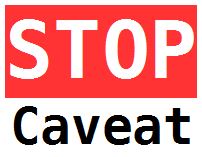Caveats
You may be asked “Do you want a Caveat” before you buy land for your new house.
I think it depends on what sort of land you are buying:
- If I was buying a block on a new large sub division I wouldn’t bother.
- However If I was looking at an existing property to knock down and rebuild I think having a caveat would be worthwhile.
I would be very reluctant to get involved in any property that has a caveat lodged on it.
Definitions
Caveat means beware, A caveat is a written warning on the ‘Title’ to anyone who wants to deal with the property that someone else’s interest already has priority.
The Caveator is the person having an interest in the property who must be notified of any attempted dealing in the property.
A Caveatable Interest allows you to lodge a caveat. The interest is acquired once a contract for purchase is signed.
Lodgement
Lodgement should be done as soon as possible.
I think that it’s best to use a lawyer to lodge a caveat to check whether:
- There is a caveatable interest
- If there are any contractual restrictions on having a caveat,
- The caveat is lodged correctly.
What are the costs?
It will depend on your lawyer/conveyoncers fees but I would expect that the costs will be around $500-$1000.
Why is an existing caveat a problem?
Well it may be difficult to complete a purchase due to the many reasons including the following three:
- Someone else has already signed a contract to buy the property and they have priority.
- A financial institution may have been allowed to lodge a caveat by the existing owner to secure a loan.
- A creditor may have a court order allowing for the lodging of a caveat.
- Other rights. There are numerous other rights that may give rise to a “caveatable interest”.
This is not a professional legal opinion and you should consult your legal representative before making any decisions.